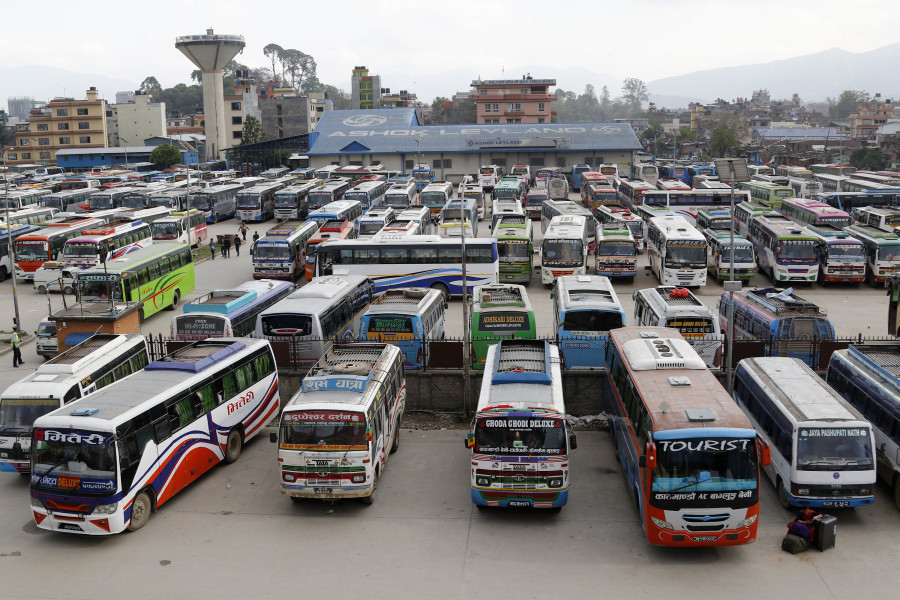Valley
As Covid-19 cases surge, bus operators worry about another lockdown
They ask the government not to repeat last year’s mistakes when they were hard hit with the lockdown and restrictions. Night business operators have called the government’s decision biased.
Anup Ojha
Uday Kumar Thapa, a micro bus driver on the Kathmandu-Pokhara route, is worried about making a living as the number of Covid-19 infections has been increasing rapidly.
“As the number of Covid-19 infection is going up, I am sure the government will impose a lockdown. But if it did like last year, this would be another misfortune,” said Thapa, a father of three schoolchildren.
“Last year for over six months, I was not allowed to ply my micro bus on the road, but I had to pay the room rent and feed my family members,” said Thapa, 48. “The government should be sensitive about working class people like me.”
Lockdown has been imposed in Nepalgunj Sub-metropolitan City from April 21 to April 25 to contain the Covid-19 surge.
Thapa said he had to take a Rs60,000 loan from the owner of the micro bus he drives.
“I paid the loan when the long-haul buses were allowed to ply in September third week last year,” said Thapa. “I have just paid my loan but I do not have any savings now.”
Like Thapa, hundreds of thousands of drivers and their assistants are worried about losing their jobs if the government announces another lockdown.
According to the Federation of Nepalese National Transport Entrepreneurs, around one million drivers and their assistants were rendered jobless due to the pandemic across the country last year, when the government banned public vehicles for six months starting from March 24, when the nationwide lockdown was announced.
The Federations’ data shows more than 400,000 public vehicles were garaged during that time.
The Cabinet on Monday made a slew of decisions of closing night businesses such as bars, pubs and nightclubs, and dohori restaurants. Stakeholders called the government's decision “unilateral and unfair”.
Now it’s transport entrepreneurs who are concerned over the government’s plan to announce blanket restrictions including on public vehicles.
With the second wave of infections from new more transmissible variants of the coronavirus, the government had made a slew of restrictions and directed provincial and local governments to take measures to check the contagion.
Yogendra Karmacharya, chairman at the Federation of Nepalese National Transport Entrepreneurs, said the government should learn from its decisions last year.
“When the government announces lockdown showing the pandemic, we need to abide by its new rule because public vehicles are mediums for spreading the disease,” said Karmacharya. “But it should not stop our business for as long as it did last year as it is directly linked with the bread and butter of thousands of families.”
Officials at the federation said they have asked the government to let them serve people following strict health protocols.
In the measures announced recently, public buses cannot carry more passengers than capacity and all passengers must wear masks, and if they do not have masks the driver or his assistant must provide masks at a cost of not more than Rs10. Hand sanitiser must be provided on the bus.
There are around 300 transport organisations under the federation from across the country.
While micro driver Thapa was lamenting the hardship caused by the prolonged lockdown last year, Kathmandu Chief District Officer Kali Prasad Parajuli hinted that lockdown may be announced soon.
“Hospitals’ intensive care units have started to fill up, and if the situation becomes worse then there is no alternative to announcing restrictions,” said Parajuli. “We are studying the present situation and based on our analysis we will take our decision.”
On Saturday the country reported 14 more Covid-19 related fatalities with 2,486 new cases and 133 antigen positives. Kathmandu Valley alone recorded 872 new infections in the past 24 hours. Of them, 644 are in Kathmandu, 141 in Lalitpur and 87 in Bhaktapur.
Night business operators are also unhappy with government decisions. Dowanj Thapa, chairperson of Ratrikalin Byawasayi Sangh, said the government closing only particular businesses was a biased one.
On Monday the government announced that restaurants must close by 8pm.
“People are still flocking to malls, jatras are being held openly. And look at the people on footpaths in the evening. The government does not monitor them,” said Thapa. “But when we said we will run our business following the government's health protocols, we are not allowed.”
According to Sangh, Kathmandu Valley has over 30,000 night business operators providing employment for over 100,000 people.
“Last year, the losses incurred when night time businesses were closed across the Valley were estimated at over Rs1 billion,” said Thapa. “We were at a phase of gradual recovery but the government asked us all to close down again.”
He said the businesses will wait for a week and then take decisions against the government's decision.
Meanwhile, according to the Metropolitan Traffic Police Division, since the announcement was made the number of vehicles plying the road has come down.
“It could be because the government announced to close schools from Monday,” said Senior Superintendent Janak Bhattarai, the chief of the division.
According to the division office, at normal times 1.4 million vehicles operate within the Valley but in the past few days an estimated 1.2 million vehicles are on the roads.
“The second wave has made a few sections of people conscious, and they have restricted their mobility but this does not apply to all,” said Bhattrai.




 19.12°C Kathmandu
19.12°C Kathmandu.jpg)












